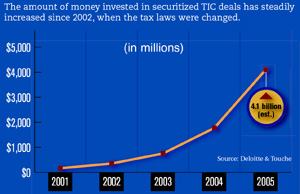–John Caulfield is a freelance writer in Old Bridge, N.J.
Exit Options
Tenant-in-common deals may be an increasingly popular investment option, but investors who want to get out of the deal early face some challenges: TICs aren’t very liquid investments.
So far, the most common option for investors looking to cash out before the property is resold has been to sell his or her ownership stake to the other investors in that particular TIC structure, although it remains to be seen how marketable that stake would be if the property’s value began to decline. Another strategy that’s gaining acceptance as a solution to this problem is an “up-REIT transaction, where investors convert the TIC into REIT shares that can be parceled off, says Mike Preston, chief operating officer for Creekstone Partners, a TIC sponsor.
Part of the challenge with exit strategies comes from the fact that questions persist as to whether SEC-regulated tenant-in-common 1031 exchanges themselves are securities, real estate, or both. The grey areas relate to qualifications and licenses to sell either, which differ markedly. This confusion has prompted investigations by the National Association of Securities Dealers into the industry’s selling practices.
Some tenant-in-common sponsors believe pro-real estate competitors are in violation of the law. But if TIC 1031s aren’t real estate, “why is a deed issued?” asks Al Mansell, president of National Association of Realtors. The Washington-based group isn’t opposed to securitizing tenant-in-common deals, Mansell says, but it does want the SEC to allow realtors to act as sponsors in these exchanges.
